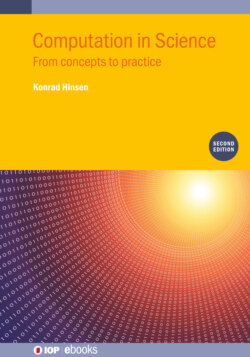Читать книгу Computation in Science (Second Edition) - Konrad Hinsen - Страница 8
На сайте Литреса книга снята с продажи.
IOP Publishing Computation in Science (Second Edition) From concepts to practice Konrad Hinsen Chapter 1 What is computation?
ОглавлениеThis book is about computation in the context of scientific research. Scientists should always try to be precise about what they say, so I will start by explaining what this term actually means. It turns out that this is not as trivial as it may seem to be. Moreover, there are also pragmatic reasons for discussing the nature of computation, because a good grasp of what computation actually is makes it much easier to appreciate what it can and cannot be used for in scientific research.
Common dictionary definitions of computation are remarkably imprecise. Oxford proposes ‘the action of mathematical calculation’ or ‘the use of computers, especially as a subject of research or study’. Merriam-Webster has ‘the act or action of computing: calculation’ or ‘the use or operation of a computer’ but also ‘a system of reckoning’. Both dictionaries refer to ‘calculation’, but do not provide useful definitions for that word either. The vagueness of these dictionary definitions can be traced back to the long-lasting confusion about what computation is and how it relates to mathematics. It was only the development of formal logic and mathematical formalism in the early 20th century that led to a precise definition of computation, which helped to pave the way to the development of automatic computing machines. This definition is the topic of section 1.1.
Beyond the exploration of what defines computation, I will also look at what computation is for scientists, i.e. why computation is so important in scientific research. Most scientists probably think of computers and computation as tools that they use to process experimental data or mathematical equations. However, there are other roles that computation plays in science, and which I will briefly discuss in section 1.2.
